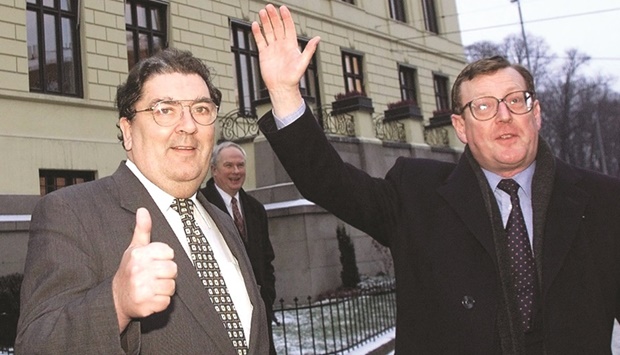Tony Blair and Bill Clinton have praised the political and personal courage underpinning David Trimble’s contribution to peace in Northern Ireland following the former first minister’s death.
Trimble, who won a Nobel peace prize for his role in the landmark 1998 peace deal that helped end three decades of conflict, died on Monday aged 77.
Northern Ireland is again enduring political tension.
Its Stormont assembly was meant to reconvene yesterday to try to overcome weeks of paralysis following elections, but that was postponed after Trimble’s death.
At the seat of Northern Ireland’s devolved government yesterday, UUP leader Doug Beattie laid a wreath of white and deep purple flowers beneath a portrait of Trimble which hangs in the Stormont assembly’s Great Hall.
Beattie praised his predecessor as a “great unionist” and a “great politician”.
“As frail as he’d become in the last number of months, there was a fire in his eyes for politics. There was a fire in his eyes for peace in Northern Ireland, and there was a fire in his eyes to try and heal the divisions which blighted to this part of the United Kingdom,” Beattie told reporters.
Former UK prime minister Blair, whose government brokered the peace deal along with Ireland and the United States, said the peace could not have been achieved without Trimble’s “masterclass of leadership”.
“David was highly intelligent, very courageous,” Blair told BBC radio yesterday.
Asked to summarise his contribution, the former UK leader said: “Immense. The hardest thing in leadership is to say no to your own supporters. He did it and he carried it.”
“He paid a political price, but he never complained,” Blair added.
Former US president Clinton said Trimble was “a leader of courage, vision”.
“His legacy will endure in all who are living better lives because of him today,” Clinton said in a statement late on Monday.
Trimble’s death following a short illness was announced by his Ulster Unionist Party (UUP) on Monday.
No further details were given about the death of a politician who, despite his staunch pro-UK convictions, worked with Irish nationalists to end the three decades of bloodshed known as the “Troubles”.
British Prime Minister Boris Johnson described Trimble as a “giant of British and international politics”.
The Irish premier, Micheal Martin, hailed the Nobel laureate as “someone who played a crucial and courageous role in bringing peace to Northern Ireland”.
Sinn Fein’s Michelle O’Neill, in line to be Northern Ireland’s next first minister after her nationalist party swept to a historic victory in the May elections, lauded Trimble’s “very significant contribution to the peace process”.
She said that Trimble was “pivotal” in securing the Good Friday Agreement, adding that the “precious gift of peace” Trimble had helped midwife with the 1998 accords was something her generation “all hold very dear”.
“That should be a message to us all even today, 24 years later. It takes courage. It takes leadership. It takes parties working together actually to achieve things,” the Sinn Fein vice-president said.
O’Neill’s accession is being held up by the now-dominant pro-UK force, the Democratic Unionist Party (DUP), which is refusing to serve with Sinn Fein in the power-sharing executive until London rips up a post-Brexit trading pact with the European Union.
The UK government is pushing through legislation to unilaterally rewrite the so-called Northern Ireland Protocol, sparking legal action by the EU.
However, the DUP has still refused to enter the power-sharing government.
UUP leader Doug Beattie urged the DUP and Sinn Fein to “show that very same courage that happened in 1998” in order to restore the Belfast executive and protect peace.
The UUP also opposes the protocol.
At his final public appearance at the end of June, Trimble said the cornerstone of peace remained in place.
“People are actually not throwing the (Good Friday) agreement to pieces, their complaints are still based on the existence of the agreement,” he said at the unveiling of a portrait of him.
The 1998 Good Friday accord largely ended 30 years of conflict in Northern Ireland that killed 3,500 people.
Following the 1998 deal, Trimble served as first minister of Northern Ireland.
However, the UUP’s popularity waned amid unionist loathing of elements of the 1998 accord, which were seen as too accommodating to republicans.
Former UUP leader Mike Nesbitt told AFP that with the loss of Trimble, the generation of leaders – including pro-Ireland Social Democratic and Labour Party leader John Hume – that delivered peace in Northern Ireland had now passed.
“These are the people who understood the concept of the greater good, who were prepared to say I will put the priorities of the people over party political interest,” he said. “That was the foundation on which the Belfast, Good Friday agreement was made. And that’s what’s missing today at Stormont.”

John Hume gives the thumbs up as fellow David Trimble waves as they leave the Nobel Institute in Oslo on December 9, 1998. They were in Norway to receive their joint 1998 Nobel Peace Prize for their efforts to find a peaceful solution to the conflict in Northern Ireland.
